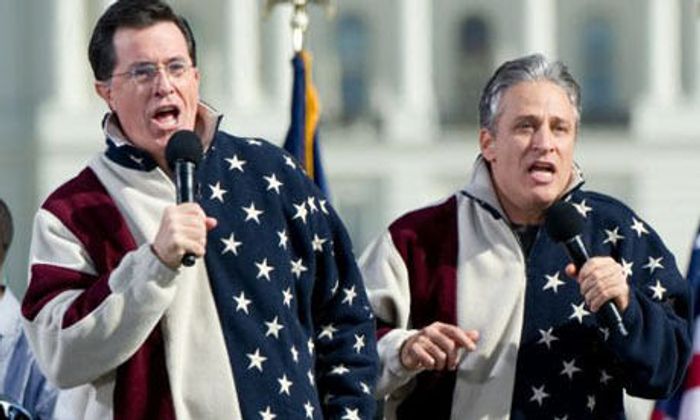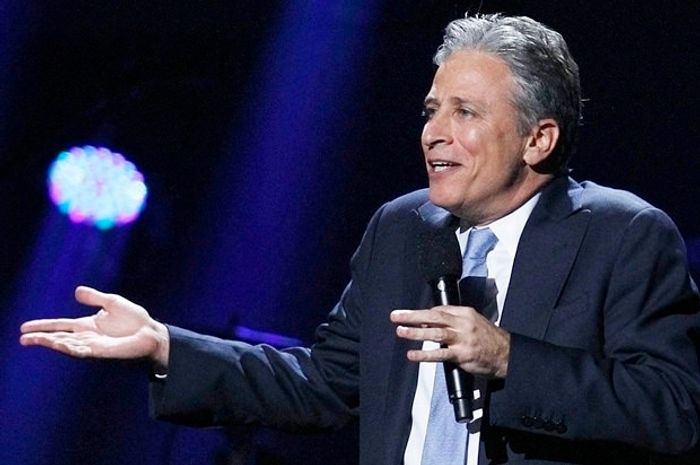
Jon Stewart: Fake news can’t save us
Jon Stewart recently talked with New York magazine’s Chris Smith on his directorial debut with the film “Rosewater.” Smith asked Stewart about the film but then quickly moved on to the questions all journalists want Stewart to answer: Does his satire pack enough of a punch? Is he replacing the traditional news with fake news? And, most important, can his show influence politics?

Does Satire News Influence Elections?
As Election Day looms, The Daily Show ramped up their media coverage by heading to Texas for a week of shows entitled Democalypse 2014: South by South Mess. A Comedy Central show relocated to broadcast on-the-spot election coverage. That should strike us as strange, right? But in all likelihood, it doesn’t. The idea that a satire news show would take election coverage so seriously no longer comes as a surprise. How did satire news become such a major player in news media? And, is its increased social power dangerous for our democracy?
Prof. McClennen delivers lecture on why Human Rights depend on the humanities at ASU's Center for the Study of Religion and Conflict.
Human rights concerns continue to occupy a central role in contemporary politics and NGOs. They also appear frequently in the teaching and research of university faculty. But do policy makers and professors speak the same language when they discuss human rights? This talk looks at the assumed breakdown in the discourses of human rights practitioners and humanities theorists, and shows that the insights of human rights theory indeed play a major role in human rights policy. By analyzing a series of key humanities approaches to the study of human rights, McClennen argues that advocacy for human rights depends on humanistic inquiry.
Read the rest at ASU Center for Study and Conflict

Stewart, Colbert and Oliver for the win: Satire, millennials and fear of an extreme right-wing Senate
This week “The Daily Show” ramped up their media coverage of midterm elections by heading to Texas for a week of shows entitled Democalypse 2014: South by South Mess. The guest the first night? Wendy Davis, of course. But before we get too excited at the idea that a satire news show is going to the center of a hotly disputed governor’s race, it’s worth remembering that four years ago today, on October 30, 2010, Jon Stewart and Stephen Colbert rallied on the National Mall in an unprecedented media stunt that put satire at the center of political debate. Compared to last midterm election’s rally, “The Daily Show’s” move to Texas may seem like a bit of a letdown.
First time in Penn State history: professor and undergrad team up to write book
University Park, PA — What if the next presidential election is decided by viewers of “The Daily Show,” “The Colbert Report” and “Last Week Tonight with John Oliver,” rather than viewers of CNN, Fox News and MSNBC? Are satirists giving a more objective and factual view of the news?
In her new book, Penn State School of International Affairs professor Sophia McClennen argues that as millennials enter the voting pool, they predominantly watch their news in the form of satire, instead of cable news, and this is changing politics. The book, “Is Satire Saving our Nation: Mockery and American Politics,” co-authored with PSU media studies undergrad Remy Maisel, points out that, while political satire has always existed alongside American politics, news parody shows are making more of an impact on millennial viewers, redefining how they engage in voting and politics.
Read the rest at Penn State News
Research center led by SIA professor obtains grants of over $2 million supporting global studies at Penn State, K-12, and in the community
UNIVERSITY PARK, Pa. — The Center for Global Studies (CGS) at Penn State, led by School of International Affairs professor Sophia McClennen, announced the award of two new federal grants that will help continue bringing together faculty and students from across the University in order to realize Penn State’s strategic goal of becoming a global university. Penn State will receive just over $2 million in Title VI National Resource Center and Foreign Language and Area Studies (FLAS) funds over four years from the U.S. Department of Education. The funding can support Penn State School of International Affairs students with internship housing or thesis projects.

Bill O’Reilly finally admits it: I’m really obnoxious!
Recent coverage of Bill O’Reilly’s appearance on Jon Stewart’s “The Daily Show” has highlighted the showdown between the two on the question of white privilege. We have seen multiple stories emphasize the encounter as a “face off” that got so intense that at times the two shouted at each other. But here’s another way of looking at it: Bill O’Reilly just can’t resist Jon Stewart’s logic.
Daily Collegian covers *Is Satire Saving Our Nation?*
Read about how my latest book is making Penn State history as the university’s first ever undergrad-prof writing team.

Jon Stewart knows best: In a Fox News world, we need satire more than “Meet The Press”
We know that satire news is increasingly a source of “real” news. We know that Jon Stewart has been voted as the No. 4 most trusted journalist, tying with Brian Williams and Dan Rather (that poll was in 2008). We know that satirists like Stewart have an active and engaged viewership of mostly millennials. And we know that over the years Stewart has been able to attract an impressive lineup of politicians, journalists and other newsmakers to appear on his interview segment.
Read the rest at Salon
John Oliver is smarter than the State Department: Irony will not defeat ISIS
While we fight a war against ISIS with airstrikes on selected targets, the U.S. is also engaging in a war of ideas. As many who have seen ISIS videos or seen pro-ISIS tweets can attest, the Islamic State group has demonstrated a skill with social media previously unseen in extremist groups. ISIS has successfully used Internet sites, YouTube, Facebook and Twitter to dangerous effect, often with the explicit goal of recruiting more militants.
Read the rest at Salon